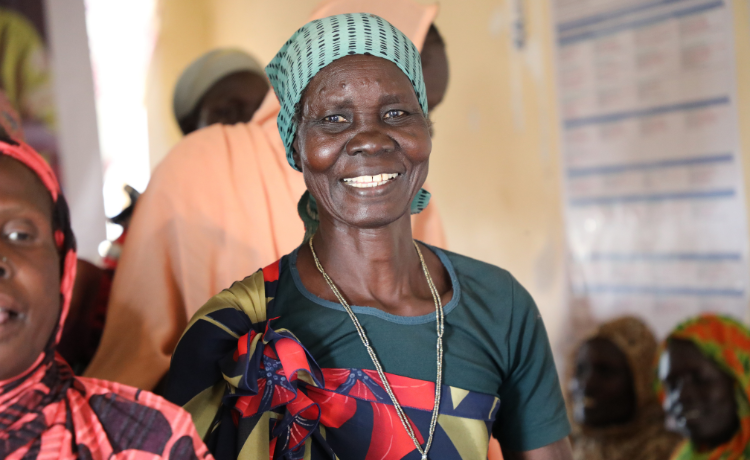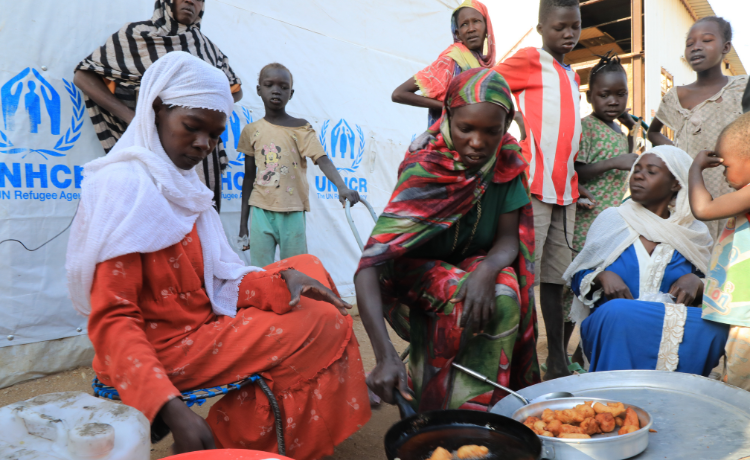News
Women at the crossroads: Fleeing war in Sudan for an uncertain future in South Sudan
- 09 April 2025
News
UPPER NILE STATE, South Sudan – Mary Kak is threading beads onto a string, making jewellery she hopes to later sell at a marketplace in Renk, a border town in South Sudan’s Upper Nile State.
“The beads we make here are sold and we earn money from it, but the most important thing is information and knowledge sharing on violence and other dangers,” she explained at a safe space for women and girls run by UNFPA, the United Nations sexual and reproductive health agency.
Ms. Kak, 55, left her home in Upper Nile State over 10 years ago to escape an impending civil war. But the mother of seven was forced to make the same journey in reverse in February last year, as fighting now erupted in her new home of Khartoum in neighbouring Sudan. With armed groups patrolling the roads, it took her several days on foot, the risk of being raped, attacked or assaulted hanging heavy in her mind. Although a long and arduous route, she said, “It was safer that way.”
But the return has not been easy. As South Sudan once again verges on civil war, she and thousands of other returnees and refugees must contend with a lack of resources, chronic unemployment and terrifying threats of sexual violence.
With armed groups patrolling the roads, it took her several days on foot, the risk of being raped, attacked or assaulted hanging heavy in her mind.
Recurrent, relentless climate shocks are also taking a particularly heavy toll on women and girls in South Sudan. With scarce protection measures available, they are at risk of being coerced into sex work, trafficked or sexually assaulted as they venture far and often alone in search of food, water and work.
A survivor of gender-based violence, Ms. Kak sought refuge at the safe space, where she received counselling and information on how to report her abuser.
Creating a fresh start

“Many survivors prefer not to report incidents out of fear or taboo,” explained Norin Nyanjang, a project officer with UNFPA. “But with community sensitization and awareness of services, they are now reporting cases and taking prevention initiatives.”
To avoid potential discrimination, all women and girls in the area are offered training courses on baking, weaving and making jewellery, so they can earn a living and rebuild their lives.
“Here we are in a safe place all together as one family,” said Ms. Kak, who was open to sharing her story. “We sing, dance, laugh and cry together. No tribal differences – no Dinka, no Shiluk and no Nuer.”
Salma Osman Ibrahim, a 28-year-old mother of three, also returned from Sudan at the end of last year, and now bakes and sells zalabia – doughnuts – at a market in Renk. “Establishing myself with nothing has not been easy, but with the baking skills and support, I make around $10 a day,” she told UNFPA.
“Here we are in a safe place all together as one family”
At the safe space, Salma was trained and provided with a start-up package for her business. “I can now smile,” said Ms. Ibrahim. “This is really contributing to my life, and I can support my family.” She also received psychological support and information on available services for survivors of sexual violence, which she shares with others.
Crisis after crisis for women and girls

Since it opened in 2024, some 4,000 women and girls have attended the Renk safe space, which is one of seven operated by UNFPA across the country. UNFPA also supports five mobile health teams and six health centres across South Sudan, and continues to distribute thousands of kits of essential hygiene and sanitary supplies for women and girls.
However, at least two safe spaces will have to close in May and multiple essential sexual and reproductive health programmes scaled back, following the termination of funding from the United States, previously one of the largest donors to UNFPA’s work in the country. This means thousands of women and girls will likely lose recourse to psychological counselling, life-saving healthcare and the chance to learn new skills.
At least two safe spaces for women and girls will close in May, as United States funding is terminated
To address the crisis over the next six months, UNFPA needs $8.8 million, of which just $1.2 million has been received. “The protection and empowerment of women and girls must be at the heart of any peace and recovery agenda,” said UNFPA Executive Director Dr. Natalia Kanem recently in a statement on South Sudan.
“In the face of this crisis, every dollar matters, every intervention counts, and every life saved is a step toward peace.”